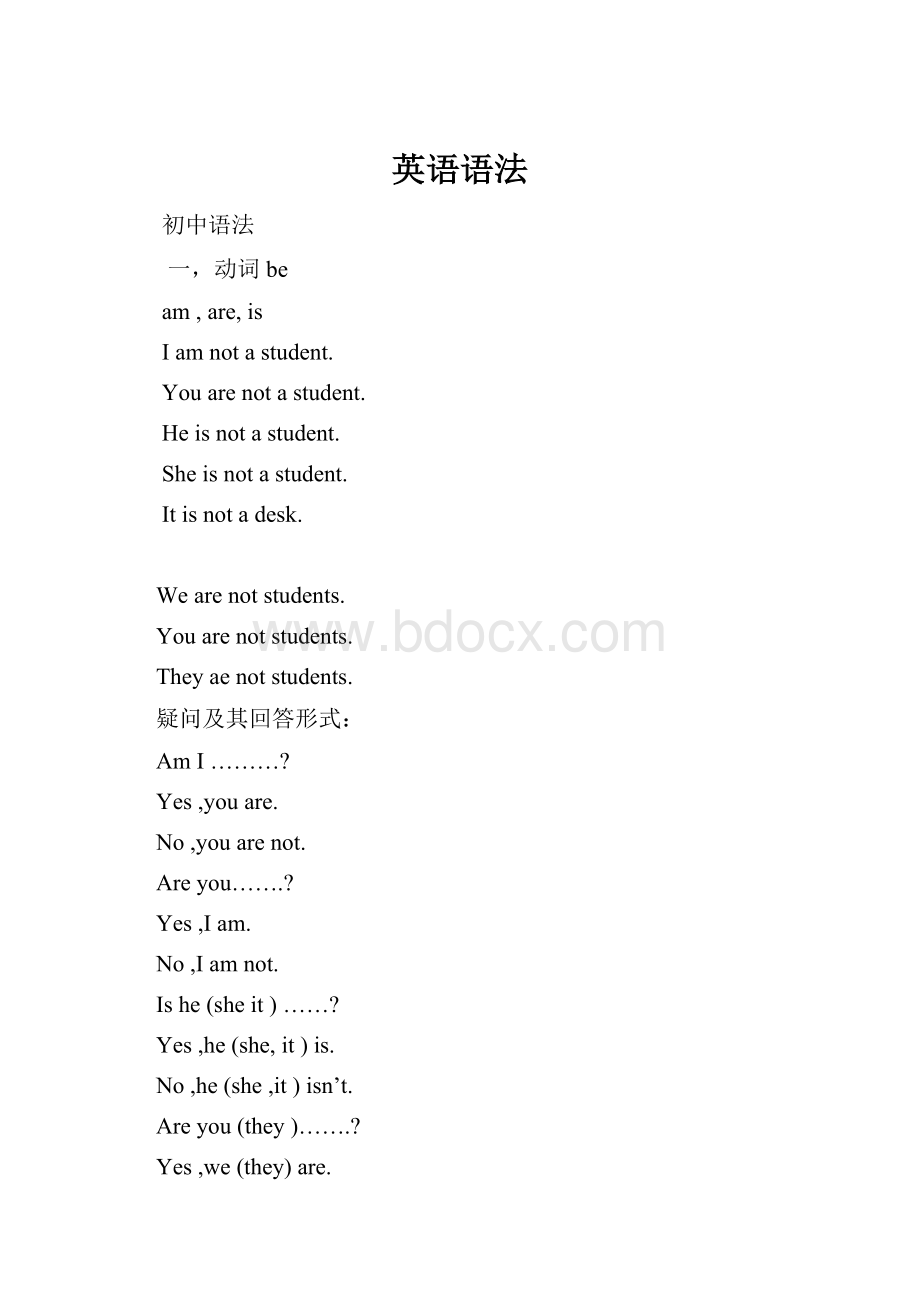英语语法.docx
《英语语法.docx》由会员分享,可在线阅读,更多相关《英语语法.docx(19页珍藏版)》请在冰豆网上搜索。

英语语法
初中语法
一,动词be
am,are,is
Iamnotastudent.
Youarenotastudent.
Heisnotastudent.
Sheisnotastudent.
Itisnotadesk.
Wearenotstudents.
Youarenotstudents.
Theyaenotstudents.
疑问及其回答形式:
AmI………?
Yes,youare.
No,youarenot.
Areyou…….?
Yes,Iam.
No,Iamnot.
Ishe(sheit)……?
Yes,he(she,it)is.
No,he(she,it)isn’t.
Areyou(they)…….?
Yes,we(they)are.
No,we(they)arenot.
二,人称代词和物主代词。
人称代词:
主格:
I,you,she,he,it,we,you,they
宾格:
me,you,her,him,it,us,you,them.
IamlearningEnglish.
Theyarepickingapples.
Wewillheepthem.
Someofusaretall.
形容词性物主代词:
myyourherhisitsouryourtheir
名词性物主代词:
mineyourshershisitsourstheirs
Myhattheirclassroomourshool
Thisisnotmycoat.
Mineisinthebedroom.
Youmayusemybike.
I’llusehis.
Theshoesaretheirs.
Heisafriendofmine.
三,thereis(are)+某物或人在某地;
》某地有某物(某人):
Thereisahouseinthepicture.
Therearesomebirdsinthetree.
Thereisn’tahouseinthepicture.
Thereisn’tanywaterinthebottle.
Therearen’tanyfactoriesinthecity.
疑问及其回答:
Isthereaboyunderthetree?
Yes,thereis.
No,thereisn’t.
Arethereanybananasonthetree?
Yes,thereare(some).
No,therearen’t(any).
Therebe表示客观存在时:
Therearefivepicturesonthewall.
Ihavefivepictures.
Therebe的现在完成时:
Therehasbeenapictureonthewallforalongtime.
动词be的现在完成时:
Thepicturehasbeenonthewallforalongtime.
be与其靠的最近的物体的单复数一致;且肯定用and连接,否定用or.
Thereisanappleandsometomatoesonthetable.
Thereearetwoballsandaboxunderthetable.
否定:
Thereisn’tadeskorchairsintheclassroom.
Therearen’tanypicturesoramaponthewall.
四,名词的复数形式。
anapple(twoapples)
abook(twobooks)
当不可数时:
Bread(somepiecesofbread)
Water(threeglassesofwater)
可数名词变复数的规则:
1,大部分名词的复数形式是在单数形式后加S。
book(books)page(pages)
2,以S,X,ch,sh结尾的名词后加es。
box(boxes)watch(watches)
3,以辅音字母加y结尾的名词变y为i加es。
factory(factories)city(cities)
4,以辅音字母加O结尾的名词加es。
potato(potatoes)tomato(tomatoes)
以元音字母加O结尾的名词只加S。
radio(radios)zoo(zoos)
少数以辅音字母加O结尾的名词只加S.
piano(pianos)photo(photos)
5,少数的名词单复数形式相同。
Chinese(chinese)sheep(sheep)
6,以F或FE结尾的名词多数变f或fe为v再加es。
knife(knives)wife(wives)
7,一部分名词有不规则的复数形式。
man(men)child(children)
8,有些名词总是以复数形式出现。
trousersclothesglasses
五,现在进行时:
Thestudentsofclassfouraeplayingfootball.
Iusuallygetupat6:
30,butI’mgettingupat6:
00everydaythisweek.
一般疑问句:
AmIeating?
Yes,youare.
No,youaren’t.
Areyoueating?
Yes,Iam.
No,Iamnot.
现在分词的构成:
1,一般情况下是在动词的原形后加上ing。
stand(standing)jump(jumping)
2,以不发音字母e结尾的动词去e加ing。
write(writing)make(making)
3,以重读闭音节结尾的动词,如果末尾只有一个辅音字母,先双写此字母再加ing。
run(running)sit(sitting)
现在进行时也可表示,最近按计划按排的一个动作,(即将来时间内发生的事情)。
WearegoingtoNanjingnextmonth.
Sheisleavingtomorrow.(gocomeleave)
feel加开容词表示主语的感觉,情感,用进行时态。
Howareyoufeelingnow.
I’mfeelingbetter.
六,动词“have”
一般疑问句及其回答:
DoIhave……..?
Yes,youdo.
No,youdon’t.
have当“有”讲时:
Haveyouabike?
Hasshearuler?
Ihaven’tabook.
Shehasn’tanybooks.
不作有讲时:
haveameal;havealesson;haveadrink;haveaparty;
haveabath;haveawalk.
七,一般现在时。
Iworkthere.
Youworkthere.
Weworkthere.
Theyworkthere.
Heworksthere.
Sheworksthere.
疑问:
DoI(youwethey)workthere?
Yes,I(youwethey)do.
No,I(youwethey)don’t.
否定:
Idon’tworkthere.
Youdon’tworkthere.
Wedon’tworkthere.
Theydon’tworkthere.
Hedoesn’tworkthere.
Shedoesn’tworkthere.
当主语为第三人称单数时,谓语动词在词尾加…..
1,一般动词加S。
like(likes)work(works)
2,以字母o,s,ch,sh,x结尾的动词加es。
do(does)go(goes)wash(washes)
3,以辅音字母加y结尾的词变y为i加es。
study(studies)carry(carries)
主语为第三人称单数时,疑问句,否定句用does构成。
Shedoesherhomeworkeveryday.
Shedoesn’tdoherhomeworkeveryday.
Doesshedoherhomeworkeveryday.
八,基数词和序数词
1,基数词
从13到19都是以-teen结尾
Thriteen
从20到90的十位整数都是以-ty结尾
sixty
从21到99…….
Eighty-five
2,序数词
1,seven------seventy
2,twenty------twentieth
3,five--------fifth
4,firstsecondthirdeighthninth
5,第几十几
基数词+序数词thirty-first
顺口溜:
一,二,三,要牢记
Ve要用f替
八去t九去e
y要变成i和e
最后th加上去
九,词类
1,n,(名词)book,tree,boy
2,art(冠词)a(an)the
3,pron(代词)wethatthis
4,adj(形容词)fatredbig
5,num(数词)onefirstthirty
6,v(动词)readgobe
7,adv(副词)nottoohere
8,prep(介词)inonunder
9,conj(连词)andor
10,int(感叹词)onhello
十,各种特殊疑问句及其回答
疑问代词:
whatwhowhosewhich
疑问副词:
wherewhyhow
Whatisthat?
It’sapen.
Whatarethese?
Theyarebikes.
What’syourname?
MynameisTom.
What’syourfather?
Heisadoctor.
Whatdayisittoday?
It’sSunday.
Whatisthedatetoday?
It’sSept.10.
Whattimeisit?
It’stwelveo’clock.
Whatcolorisit?
It’sblue
WhatdoyoudoonSunday?
IdomyhomeworkonSunday.
Whatdoesshedo?
Sheisadriver
Whoarethey?
TheyareLiLeiandLinTao.
Whosewatchisit?
It’shers.
Whoseshoesarethese?
Theyarethetwins.
Wheredoyouwork?
Iworkonafarm.
Wherearethisfootballclothes?
Theyarebehindthedoor.
Whichisyours,theblueoneortheredone?
Theblueoneismine.
Whendoyougetup?
Iusuallygetupatsix.
Whyareyoulate?
Ididn’tcatchthebus.
Howareyou?
Fine,thanks.
Howoldareyou?
I’mfourteen.
Howmanypeoplearethereinyourfamily?
Therearethreepeopleinmyfamily.
提问主语时,特特殊殊疑问句的语序和陈述句的到致。
Wholivesinthehouse?
MisGaolivesinthesehouse.
十一,句子的种类
1,陈述句
FootballisaverypopulargameinChina.
Wedidn’thaveameetingthisafternoon.
2,疑问句
Doyouhaveanyfriendsinthatschool?
What’stheweatherliveAustralia?
3,祈使句
Doitlikethis!
Throwitlikethis!
Don’tworry!
Pleasegivemeapieceofpaper!
4,感叹句
Howcolditis!
Howdelicioustheyare!
Whatagoodidea(itis)!
十二,形容词,副词的比较级和最高级
1,规则变化
A,一般的
talltallerttallest
clevercleverercleverest
B,以E结尾的
largelargerlargest
nicenicernicest
C,以辅音字母结尾
bigbiggerbiggest
thinthinnerthinnest
D,辅音字母+Y结尾的
easyeasiereasiest
happyhappierhappiest
delicious,moredelicious,mostdelicious
carefully,morecarefully,mostcarefully
不规则的变化
good/well,betterbest
bad(ly)/ill,worseworst
many/much,moremost
littlelessleast
far,farther,farthest
far,fartherfarthest
比较级的用法
Jimistallerthanjohn.
Thiscakeismoredeliciousthanthatone.
LiLeijumpedfartherthanJim(did).
最高级的用法
最高级的前面一般加定冠词the,副词前面可以不加,后面跟介词短语表示范围。
Springisthebestseasonoftheyear.
Sheistheyoungestintheclass.
Thispictureisthemostbeautifulofthetree.
Hejumpedfarthestofall.
在形容词的比较级前用much或little修饰。
muchbetteralittletaller
表示甲与乙相同时,差不多时用as表示
Physicsisasimportantasmaths.
TomwritesascarefullyasMike.
表示甲不如乙时,用notas或so+adj
HethinksEnglishisnotas(so)importantasmaths.
Shedoesn’tsingas(so)wellashersister.
两样东西比较时,注意后半部分的表述。
ChinahasalargerpopulationthanCanada(has).
ThepopulationofChinaislargerthanthatofCanada.
比较级+as+比较级表示,越来越….
Butshelookedatmeandcriedharderandharder.
the+比较级+the+比较级,表示,越怎样就越怎样
Themorewelookedatthepicture,thelesswelikedit.
十三,冠词
在名词前用来说明名词
定冠词,the
不定冠词,a,an
不定冠词
Annwantstobeanengineer.
Aplaneisamachine.
Aboyiswaitingforyou.
He’llbebackinaboy.
词组,afew(用于可数名词)
alittle(用于不可数名词)
定冠词
用于某些特定的人或物时:
BeijingisthecapitalofChina.
谈话双方都知道的人或物
Closethedoor,please.
上文提到的人或物,
Thisisapicture.
Thereisariverinthepictureandthereisaboatintheriver.
世界上独一无二的,
Themoonismuchsmallerthanthesun.
用在姓氏的复数前表示全家人或夫妻二人,
TheGrensarewatchingTV.
用在形容词最高级和序数词前
Heisthetallestinclassone.
Thefirstoneisgreen.
用在某些专有名词前
TheGreatWallisafamousplace.
用在乐器的名称前
Playtheviolin
Playthepiano
用在习惯用语中
inthemorning
ontheright
inthefrontof
有些情况不用冠词
A,专有名词
China,classTwo,GradeThree.
B,名词前己有物主代词,指示代词,名词所有格……所以前面不用冠词
Sheismysister.
Thatpenismine.
C,在节日,星期,季节等名称前
Tomorrow,Children’sDay,(NewYear’sDay….)
It’scoldinwinter.
WehavenoclassesonSaturday.
It’sJanuary.
D,表示一日三餐或球类运动时,
Theywentoutaftersupper.(晚餐)
Theyoftenplaybasketballafterclass.
E,在某些固定的词语或短语前面,不用定冠词
afterschool,atnight,bybus.
用定冠词与不用定冠词的区别
infrontof(在。
。
。
的前面,在某物之外)
inthefontof(在。
。
。
的前部,在某物之内)
gotobed(去睡觉)
gotothebed(到床那边去)
inhospital(住院)
inthehospital(在那家医院)
gotoschool(上学)
gototheschool(去那所学校)
十四,反身代词(表示自己这个概念的代词,一般不能独立做主语)
构成:
单数,myself,yourself,himself,herself,itself.
复数,ourselves,yourselves,themselves.
用法,A,主语的同谓语,加强语气,可在主语后或句未。
Imyselfcandothiswork.
Icandothisworkmyself.
B,作宾语。
LinTaomadeakiteforhimself.
LinTaomakehimselfakite.
C,作表语。
Heisnothimselfthesedays.
Thatgirlinthephotoisherself.
十五,动词的种类。
行为动词:
含有实在的意义,表示动作或状态,且在句中可独立做谓语。
Shehassomenoodlesforbreakfast.
Theyoftengotoschoolearly.
I’mcleaningthehouse.
行为动词可分为:
及物动词和不及物动词。
及物动词+宾语,意义才完整
Hewashedhishands.
Hecamelate.
连系动词,不能独立做谓语,与表语一起构成复合谓语。
Hisfatherisafarmer.
Thetwinslookthesame.
助动词(本身无词意,和动词一起构成谓语)
Hedoesn’tspeakEnglish.
Wearedoingourhomework.
Doyouhaveaneraser?
情态动词(本身有一定的意义,和主要的动词构成谓语部分,表示说话人的语气和行态,无人称和数的变化)
ShecanspeakalittleEnglish.
MayIborrowyourbike?
Wemuststudyhard.
及物动词有的可以跟两个宾语,直接宾语(一般指物)和间接宾语(一般指人)
常见的动词
ask,bring,buy,choose,give,hand,get,find,lend,leave,make,wish,spare,order,teach.
一般情况下,间接宾语在前,直接宾语在后。
Heoftentellsmestories.
I’llbuyherapresentonherbirthday.
若直接宾语在前,间接宾语在后,间接宾